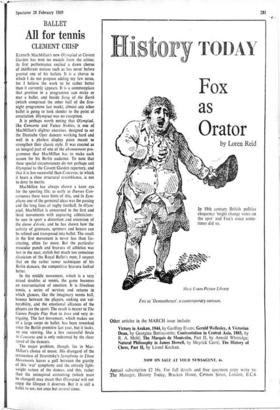All for tennis
BALLET CLEMENT CRISP
Kenneth MacMillan's new Olympiad at Covent Garden has won no medals from the critics; its first performance excited a dawn chorus of indifferent notices such as has never before greeted one of his ballets. It is a chorus to which I do not propose adding my few notes, for I believe the work to be rather better than it currently appears. It is a commonplace that position in a programme can make or mar a ballet, and beside Song of the Earth (which comprised the other half of the first- night programme last week), almost any other ballet is going to look slender to the point of emaciation. Olympiad was no exception.
It is perhaps worth noting that Olympiad, like Concerto and Valses Nobles, is one of MacMillan's slighter exercises, designed to set the Deutsche Oper dancers working hard and well in a plotless display piece meant to strengthen their classic style. It was created as an integral part of one of the abonnement pro- grammes that MacMillan has to make each season for his Berlin audience. To note that these special circumstances do not perhaps suit Olympiad to the Covent Garden repertory, and that it is less successful than Concerto, to which it bears a close structural resemblance, is not to deny its merits.
MacMillan has always shown a keen eye for the sporting life; as early as Danses Con- certantes there were hints of this, and in Sym- phony one of the germinal ideas was the passing and the long lines of rugby football. In Olym- piad, MacMillan is concerned in the first and third movements with capturing athleticism: he sees in sport a distortion and extension of the danse decole, and he has shown how the activity of gymnasts, sprinters and boxers can be refined and transposed into ballet. The result in the first movement is never less than fas- cinating, often far more. But the particular muscular punch and bravura of athletics was lost in the neat, stylish but much too conscious classicism of the Royal Ballet's men; I suspect that on the rather rawer techniques of his Berlin dancers, the competitive bravura looked better.
In the middle movement, which is a very mixed doubles at tennis, the game becomes an exteriorisation of emotion. It is frivolous tennis, a series of services and returns in which glances, like the imaginary tennis ball, bounce between the players, seeking out vul- nerability, and the emotional alliances of the players are the sport. The result is nearer to The Games People Play than to Jeux and very in- triguing. The last movement, which makes use of a large corps de ballet, has been reworked since the Berlin premiere last year, but it looks, on one viewing, like a less successful finale to Concerto and is only redeemed by the sheer speed of the dancers.
The major problem, though, lies in Mac- Millan's choice of music. His disregard of the seriousness of Stravinsky's Symphony in Three Movements leaves a gulf between the gravity of this 'war' symphony and the entirely light- weight nature of the dances, and this, rather than the uninspired costuming (which must be changed) may mean that Olympiad will not enjoy the lifespan it deserves. But it is still a ballet to see; not once but several times.


































 Previous page
Previous page